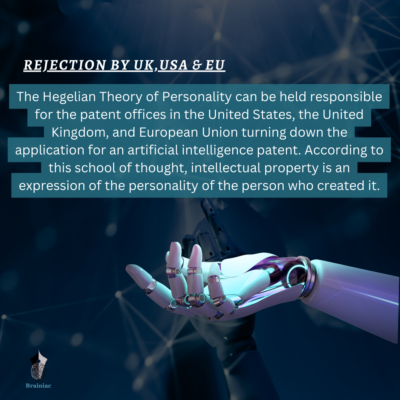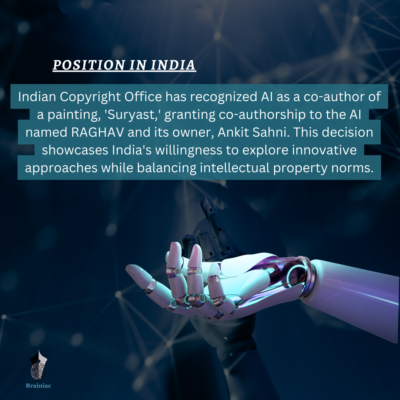Introduction
A study conducted in 2019 by the World Intellectual Property Organization (WIPO) found that the number of patents connected to artificial intelligence (AI) has significantly increased in a variety of areas, including telecommunications, transportation, and life sciences. This highlights the increasing influence that AI is having on driving innovation and technical breakthroughs all across the world.
A landmark decision by South Africa
In a recent development, the South African Intellectual Property Office made headlines by granting a patent to an AI called DABUS (device for the autonomous bootstrapping of unified sentience). Designed by Stephan Thaler, CEO of imagination engines, DABUS received a patent for its fractal-based food container. On the other hand, the exact same application was turned down by patent offices in Europe, the United Kingdom, and the United States, which led to criticism of South Africa’s judgment.
Understanding South Africa’s decision
 Despite the criticism from around the world, the decision made by the South African IP office is in line with the laws that are already in place in the country’s government as well as the aim of encouraging innovation. Notably, 2018 saw the beginning of patent reform in South Africa, which was highlighted by the implementation of the Intellectual Property Policy Phase I. After then, a number of additional key policy instruments were released, each of which placed an emphasis on the significance of science, technology, innovation, and the coming of the fourth industrial revolution.
Despite the criticism from around the world, the decision made by the South African IP office is in line with the laws that are already in place in the country’s government as well as the aim of encouraging innovation. Notably, 2018 saw the beginning of patent reform in South Africa, which was highlighted by the implementation of the Intellectual Property Policy Phase I. After then, a number of additional key policy instruments were released, each of which placed an emphasis on the significance of science, technology, innovation, and the coming of the fourth industrial revolution.
Rejection by USA, UK and EU
 The Hegelian Theory of Personality can be held responsible for the patent offices in the United States, the United Kingdom, and European Union turning down the application for an artificial intelligence patent. According to this school of thought, intellectual property is an expression of the personality of the person who created it. The regulations governing patents in these areas declare unequivocally that they are only applicable to human inventors. They place an emphasis on the requirement of “mental conception,” which is thought to be a capacity that is unique to the human mind. In addition to this, the rights of inventor ship can only be granted to human beings.
The Hegelian Theory of Personality can be held responsible for the patent offices in the United States, the United Kingdom, and European Union turning down the application for an artificial intelligence patent. According to this school of thought, intellectual property is an expression of the personality of the person who created it. The regulations governing patents in these areas declare unequivocally that they are only applicable to human inventors. They place an emphasis on the requirement of “mental conception,” which is thought to be a capacity that is unique to the human mind. In addition to this, the rights of inventor ship can only be granted to human beings.
The Australian Dilemma & Reversal
In a landmark case in 2021, the Australian Federal Court ruled for the first time under the Australian Patents Act 1990 (the Act) that an artificial intelligence (AI) machine could be designated as an inventor on a patent application and agreed that DABUS (an artificial intelligence) could be the inventor.
On appeal to this decision, a five-judge majority of the Australian Full Federal Court unanimously reversed that ruling on appeal, stating that for the Act to apply, an inventor must be a natural person. This most recent decision brings Australia back in accord with the decisions of courts in United States, United Kingdom and European Union.
Prospects in India: An open door?
 Form 1 of the Patents Act contains application 3B, which allows the applicant to be a natural or non-natural person, such as a small business, a startup, or another entity. The term ‘other’ is highly interpretable and can be used in a variety of contexts not mentioned precisely.
Form 1 of the Patents Act contains application 3B, which allows the applicant to be a natural or non-natural person, such as a small business, a startup, or another entity. The term ‘other’ is highly interpretable and can be used in a variety of contexts not mentioned precisely.
In addition, the Act does not define the term “inventor,” but it does define the term “patentee” in section 2(p), which states that a patentee is “the person for the time being entered on the register as the grantee or proprietor of the patent.” In addition, section 2(s) specifies that the definition of “person” includes the government; the word “includes” indicates that this definition is exhaustive. When read in conjunction with Section 6, which establishes the list of individual’s eligible to apply for a patent, these sections should result in the establishment of a set of rules and regulations enabling the exploration of this possibility in India.
Moreover, the Indian Copyright Office has recognized AI as a co-author of a painting, ‘Suryast,’ granting co-authorship to the AI named RAGHAV and its owner, Ankit Sahni. This decision showcases India’s willingness to explore innovative approaches while balancing intellectual property norms.
Call for amendments
In light of the growing importance of artificial intelligence (AI) and machine learning (ML), the Parliamentary Standing Committee in India has published a study that suggests modifying the current Patents Act and Copyright Act in the country. The goal of the reforms that are being proposed is to adapt the existing legal framework to account for AI as well as ideas and works generated by AI. Although there has not been a patent application for AI submitted in India as of yet, the results of such an application, should one be made, would be of significant interest.
Conclusion
Even while developing nations like South Africa and India are working hard to encourage innovation, it does not seem prudent to grant patents or co-authorship rights to AI entities just yet. The current iteration of the world’s rules governing intellectual property cannot accommodate the recognition of AI as the creator or inventor of intellectual property.
#AI #AIOWNERSHIP #AIINVENTOR #DABUS #SOUTHAFRICA #AIAUTHOR


